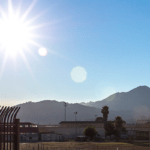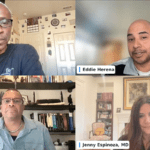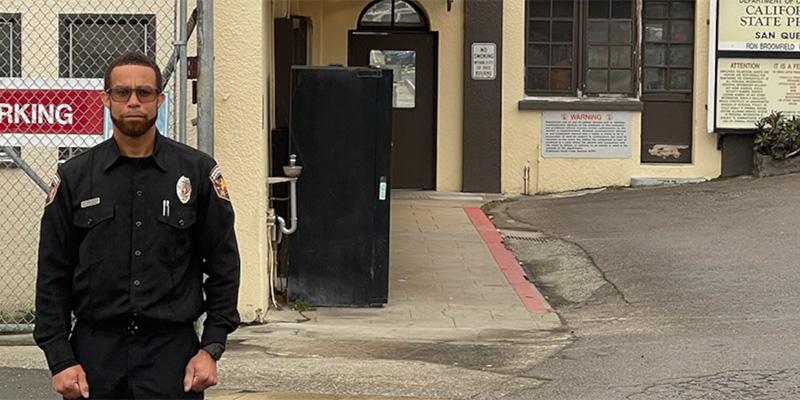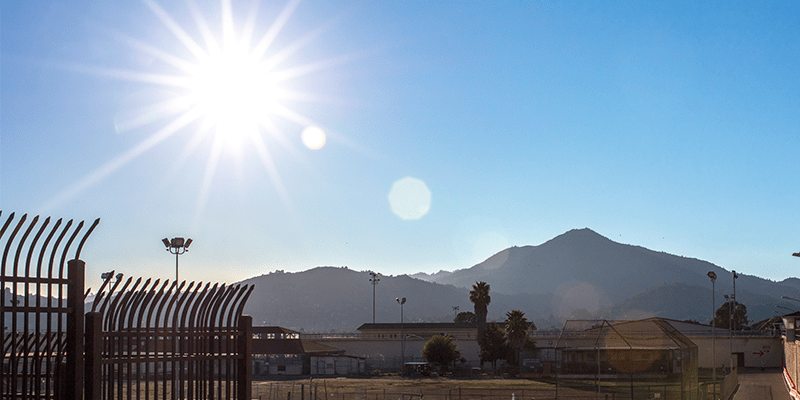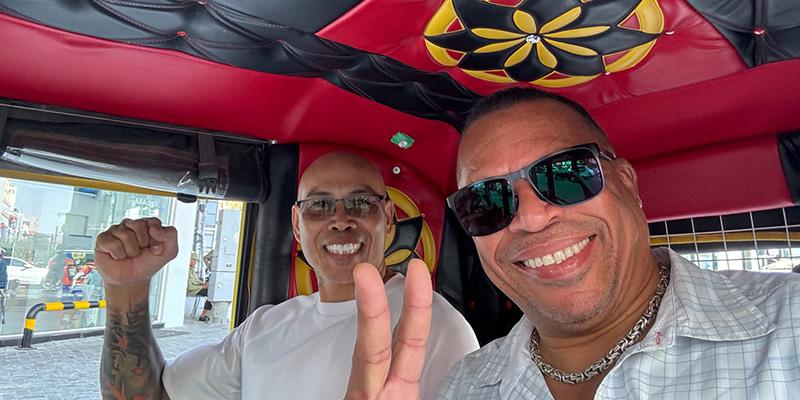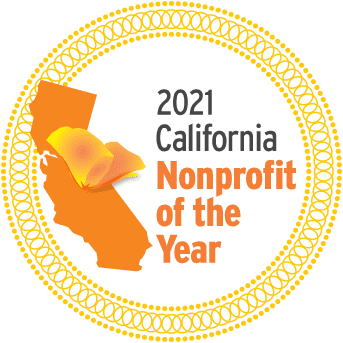Last semester, Mount Tamalpais College created a Computer Lab for its students inside San Quentin State Prison. The lab is in Education’s B building, a field house-type structure with a distinctive red roof that is behind a gate inside of the gate that separates Education from the yard.
In February 2023, MTC loaned its English 204 students their own personal laptops complete with a mouse, charger, and backpack as a carrying case. This was the first time students had been granted access to a personal laptop in their cells.
“Surprise!” our English 204 instructor Leasa Graves said as Amy Brunson, Director of Library Services and Educational Technology for MTC, came through the door with Dell laptops. Each laptop came in a cloth backpack, which we were being given for the semester. After a few technical and logistical delays, this was MTC’s first delivery of 12 laptops.
Amy talked to us about several aspects of how to use the laptops now and as the range of available information expands. At one point, she told us, “You’re not going to get in trouble if it breaks.” This statement came in that classic MTC way, with understanding and care for our position as prisoners who have a fear of getting into trouble for anything that goes wrong.
This is just a reality of being a student inside a prison. I immediately thought about being “pulled over” (stopped by a correctional officer, put up against a wall, and searched) and questioned about where the hell I got a backpack and laptop from. Years in prison ingrains that kind of fear in you even when a positive development occurs.
Amy reminds us of the value of this access. “(Technology) is just a really important piece of functioning as a human being in this day and age,” she said. It is extremely important to have access, leave here and succeed, and fulfill educational goals. Technology opens up a whole world of information…than you would have known otherwise.”
A prison is a place where some people have never used a computer or an iPhone. Some have never even used flip phones, which for those who do not know, were a thing 15 years ago. So, yeah, this is big.
For me, the happiness and joy and humanity of feeling like a normal student and person is unmistakable. How it felt to be on a laptop doing my homework in that A-4 classroom in the Education building on the Lower Yard at San Quentin, then anywhere else I wanted, was what people call surreal. This all means so much to a life-long learner and dedicated writer. I am so grateful.
At the same time, MTC has only helped to feed and develop my critical thinking and inquisitiveness. As I questioned the system within myself, I thought, “This positivity is meager, it is only a reflection of the depth of the deprivation of my humanity by the system that does not care about me, that possession of an electronic device only feels like having humanity again.”
With the Computer lab, MTC has provided a space for students to prepare for life after being released, and to get simple life skills that the prison system does not provide such as looking up information, which can lead to being able to do basic tasks like online banking and using an Uber.
Independence for us means being able to do these things without having to ask a family member for help to do it. These skills represent self-sufficiency and pride in managing one’s own life.
I decided to interview Amy Brunson, MTC’s Director of Library Services and Educational Technology, on the Computer Lab, the Laptop Program, us, and herself.
Why is it important for the incarcerated to have greater access to technology?
Technology is such a huge part of our modern world. We use technology in our professional lives, in education, and in our personal lives. It’s just a really important piece of functioning as a human being in this day and age. It is extremely important to have access [to technology here,] to leave here and succeed, but also to fulfill educational goals. Technology opens up a whole world of information when you know how to use it than you would have known otherwise.
When our students learn how to use Arcaid (the CDCR-provided website database for reentry services), when they learn they can look up resources for themselves, they are able to plan for Reentry better. I’ve seen students find housing options like transitional housing that they did not know existed.
Why did you come up with a course curriculum for Computer Literacy (the 7 modules)?
MTC Volunteer Newton Xie created the first 5 modules before I got here. MTC’s Senior Researcher for Policy and Practice, Kirsten Pickering, was also involved [in the creation of the modules] and I created one. It was straightforward to identify what content needed to be created for the modules because there is such a limited amount of programs on the laptops, like Google Chrome and Microsoft Office there are 5 things available. We didn’t initially have a PowerPoint or Excel module, so Newton created PowerPoint and I created Excel.
Why do you think they have been such a success in engaging the students?
For one, students who are new to using computers, or haven’t in a long time, may go to the lab and not know where to start. They may not be comfortable asking the inside or outside lab assistants for help, so the modules give students a way to learn independently and the modules just guide the students through the basics of learning how to use the computer. The modules are also more popular in part because of the snazzy certificates and chronos earned once they complete all the modules.
How have the Computer Lab and the Laptop program impacted the students? Do you have any experiences or stories about this?
I have noticed that it has been busier this semester. There was a lot of excitement when it first opened, but then things died down a bit. It was not as busy last spring. This semester it’s picked up more. It’s really nice that we’ve moved into a larger space (B-Building), we are trying to create a welcoming space that is comfortable where they can learn with their peers. I’ve noticed that people are helping each other out, when someone doesn’t know how to do something there’s always someone willing to step in and help out. It’s a very collaborative environment.
We started using Canvas [the CDCR-approved website which is a learning management system] this semester and we are going to be implementing it in more and more classes in future semesters. It was hard for some students to get used to. I have seen several examples of classmates showing each other how to use Canvas to submit assignments or how to read and post on the discussion boards.
I’ve had different conversations (about the impact of the computer lab) that blend together. Several students have told me that their grandkids would be proud of them because they (the grandkids) are on the internet and Facebook and they feel like they can be part of their world now that they can practice using a computer for the first time.
A person was able to look up transitional housing that is LGBTQ+ friendly. She told me that she didn’t think she’d be able to find one that would take her. The first time she got on Arcaid (a CDCR pre approved website) she found 10 or 20 places that would take her. So that was cool and nice to see. On the outside, we can Google anything and can find any specific resource that we need and here, you all are not able to do that. It’s nice to see people accessing resources that are inclusive of more people’s needs.
It’s been really great to see the Peer Lab assistants take a lot of initiative and responsibility for the computer lab space and the curriculum as well. Since we’ve had the Canvas course, some student assistants are developing and leading their own workshops…has allowed a lot more communication and collaboration between the peer assistants to solve problems together. A lot of times it’s a problem that I did not know how to solve (like technical laptop issues). Even though I am in charge, you all are the backbone of this operation.
How has the Computer Lab, laptop program, and your own work impacted YOU?
I never feel like I’m doing enough. There’s just so much room for growth and so much progress that needs to be made, but this is an environment where things move really slowly and it takes a lot of effort to change things. It is really exciting every time that something new happens like if we are able to get a new website approved or a new workshop or even when we got the new mice for the laptops.
Everything like that feels great, it’s nice to see how much people in here appreciate it, but every time something like that happens, I remember how much needs to be done.
WHY?
I don’t know why, it is just something that needs to be done. When I started working in jail (libraries), it was just work that needs to be done. There is just so much misinformation in the public about who is in prison, why they’re in prison, and what it’s like in prison, I just feel like the world needs more people who are willing to work in that environment in a way that brings about positive change. It’s something I’ve been passionate about for a while.
One time, I had a fortune teller tell me that my great-uncle was my guardian angel. He was in prison for my whole childhood until I was 12 or 13. He was a weird guy, and not a lot of people understood him. He and I got to know each other after he got out and we became pretty close. We only had a few years together and he passed away when I was 15 or 16. I always felt like he was a special part of my life. So maybe he’s influencing my desire to work in prisons. Uncle Mike.
What have you learned from doing this work?
It’s interesting; I think that doing this (work) has made me a better communicator in conversation. I’ve noticed so many of our students have a very mature, clear, insightful way of speaking that’s really emotionally intelligent, and that made an impact on me. It also made me realize how much self-work you all do here with all of the self-help and groups and counseling and what you all are involved in. You all are doing so much more work than people on the outside do. It made me want to work on myself and makes me want to be more self-aware and direct.
In my experience in this place, it does not get better than that.


